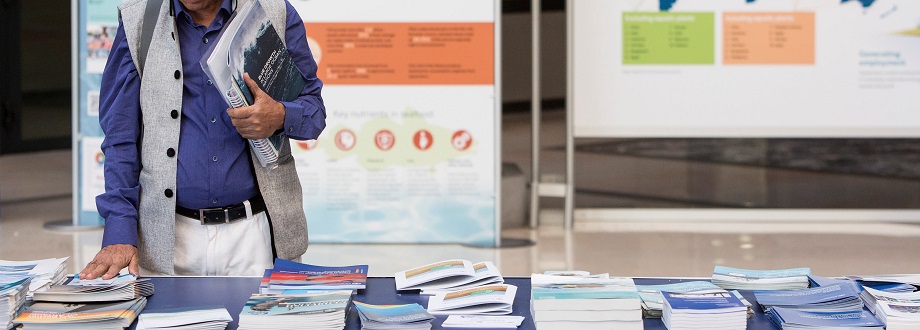Publications

Category: Strengthening Capacity
Type of document: Reports
This side event took place at the second intergovernmental conference on BBNJ, co-organized by the International Coastal and Ocean Organization (Secretariat of the Global Ocean Forum), the Permanent Mission of Monaco to the United Nations, the Food and Agriculture Organization of the United Nations (FAO), the Intergovernmental Oceanographic Commission (IOC) of UNESCO, ATLAS, and the Ocean Policy Research Institute of Sasakawa Peace Foundation, Japan.

Category: Deep Seas & Biodiversity
Type of document: Reports
The Common Oceans ABNJ Deep Seas Project is funded by the Global Environment Fund and implemented by FAO and the UN Environment Programme. The partnership brings together a broad range of partners, including regional fisheries bodies responsible for the management of deep-sea fisheries, fishing industry partners, and international organizations to achieve sustainable fisheries management and biodiversity conservation of deep-sea living resources in the ABNJ. To showcase existing knowledge, practices and innovative research for sustainable deep-sea fisheries management and biodiversity conservation in the ABNJ, the Food and Agriculture Organization of the United Nations (FAO), in collaboration with UN Environment World Conservation Monitoring Centre (UNEP-WCMC) and the SponGES Project consortium, organized a meeting – the ABNJ Deep Sea Meeting 2019 – that took place on 7-9 May 2019, at FAO Headquarters in Rome, Italy. Over 40 participants, including representatives from partner organizations and other stakeholders from multiple sectors within the ABNJ, attended the three-day meeting. While significant progress has been made in the management of deep-sea fisheries and in the protection of vulnerable marine ecosystems, the ABNJ still faces threats from climate change, ocean acidification, biodiversity loss, and pollution. Building on the achievements of the Common Oceans ABNJ Deep Sea Projects and the SponGES Project, the participants were invited to give presentations on key topics and discuss emerging issues concerning ABNJ governance and deep-sea research, monitoring and management.

Category: Tuna & Biodiversity
Type of document: Reports
The document summarizes results obtained during the noted in round 9.3-4 workshop

Category: Deep Seas & Biodiversity
Type of document: Reports
The relevance of connectivity for marine biodiversity has been recognised in the negotiations for a new international legally binding instrument for the conservation and sustainable use of biodiversity of areas beyond national jurisdiction. This technical brief provides evidence to support future negotiations. It explains how connectivity can be considered in negotiations on three of the four ‘package elements’ of the instrument: area-based tools, environmental impact assessments and technology transfer and capacity building. This technical brief provides an opportunity to consider appropriate ways to include ecological connectivity in order to support the delivery of the ecosystem approach.
This brief was produced under the auspices of the ABNJ Deeps Seas Project funded by the Global Environment Facility. This is a 5-year project jointly implemented by the Food and Agriculture Organization of United Nations (FAO) and United Nations Environment Programme (UN Environment) in partnership with regional fisheries bodies, Regional Seas Programmes, the fishing industry, international organziations and governments.

Category: Tuna & Biodiversity
Type of document: Reports
These workshops held in the Western Pacific Ocean, in Phonpei and Port Moresby the 23th and 28th of January 2019, are part of the research that International Seafood Sustainability Foundation (ISSF) is coordinating with support provided by the Common Oceans ABNJ Tuna Project to move towards the use of biodegradable FADs. The initiative addresses some of the challenges facing the fishing sector by implementing best practice solutions to reduce the amount of plastic used to construct FAD´s structures, with the aim to contribute to achieving responsible, efficient and sustainable fisheries and biodiversity conservation.

